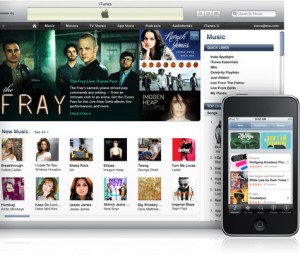If Apple can simply get this message out the door, the iPod touch will sell itself to families looking to maximize their holiday budget. iTunes 9 and Home Sharing is what can make the iPod touch the one gaming system that no family can live without, one whose value is considerably better than anything Sony or Nintendo offer. [ad#Google Adsense 300×250 in story]I have three kids ages 9 to 14 in my house. All of them are video game nuts, just like their old man, and each of them has a handheld game system they’ve come to rely on. Nintendo is the most popular handheld game company in our house. Unfortunately, cartridges for the DS and DSi don’t come cheap, and siblings regularly resort to violence and intimidation to borrow each other’s games.
For my part, I’ve convinced one of my kids that an iPod touch is the right thing to hope for under the Christmas tree this year. And he’s the master salesman — I’m pretty sure he’ll break the other two before too long.
Buy it once, play it on up to five machines
Home Sharing lets five Mac or PC users under the same roof share all the content they’ve purchased on the App Store. It’s a feature of Apple’s recently released iTunes 9, and it’s trivially easy to use. Once you’ve turned it on and keyed it to a master account, any of the audio, video, or applications in the iTunes libraries of those five computers can be shared. The same goes with audiobooks, podcasts and even ringtones.
Over the past year, I’ve amassed quite a collection of games for my iPhone 3G. Everything from word games to puzzle games, arcade games, some role playing games — my interests run pretty deep.
 The second my kids get their own iPod touches, they can use every single game I already own. They can copy music and video I want to share with them, too.
The second my kids get their own iPod touches, they can use every single game I already own. They can copy music and video I want to share with them, too.
This means no more lost cartridges or discs under the couch or behind the bed. This means no more pulled hair or scratches and bruises over who gets to play now.
But what’s in it for developers?
The value proposition here seems remarkably lopsided in favor of the consumer, until you scratch the surface. Because when Apple introduced iPhone OS 3.0 earlier this year, they put in a feature that’s been making game developers in the console market a bundle of money: It’s called downloadable content (DLC), but you probably know it better as In-App Purchases.
Developers who want to play in the App Store need to accept that Apple’s running the show when it comes to distribution. That means that digital rights management (DRM) is under Apple’s control, as well: Developers need to accept that up to five iPhones or iPod touches can play the game they’ve only made only one sale on.
But Home Sharing doesn’t extend to In-App Purchases. Anything that enhances the game enough for the developer to charge extra for is fair game in this scenario, so a 99 cent game may ultimately net the developer several extra dollars per unit in add-ons. If one of my kids grabs a new level pack for one of their favorite games and the others want it, that’s two additional sales.
In the end, Apple is left with an important message to broadcast to consumers: The iPod touch is a great gaming machine and a great value. At a time when many families are continuing to stare down the barrel of unemployment, underemployment or just an unsteady economy, it’s a message that resonates.
